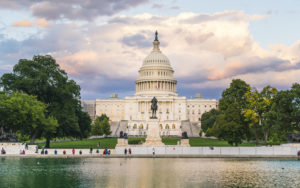
An appeals court halts student loan forgiveness, Congress passes a bill that limits use of non-disclosure agreements, and more…
IN THE NEWS
- A federal appellate court temporarily halted the Biden Administration’s plan to forgive up to $20,000 in federal student loans until it adjudicates a lawsuit challenging the program. The court emphasized that debt forgiveness would be irreversible once enacted and explained that a temporary injunction would not undermine the program’s goals. The injunction comes days after a federal district court heard a separate challenge to the program and held that, absent clear authorization from Congress, the Administration’s debt forgiveness plan constitutes “an unconstitutional exercise of Congress’s legislative power.” The U.S. Department of Education announced that it has stopped accepting loan forgiveness applications but is taking steps to overturn the orders.
- The U.S. House of Representatives passed the Speak Out Act, which would prohibit courts from enforcing nondisclosure agreements that limit workers’ ability to discuss incidents of sexual harassment or assault in the workplace. The U.S. Senate approved the Act by unanimous vote in September 2022. Gretchen Carlson, a journalist and co-founder of Lift Our Voices, celebrated the legislation as a means to “help end the silencing of survivors of workplace abuse.” President Joseph R. Biden voiced support of the bill and is expected to sign the bill into law.
- A federal judge ruled that the Affordable Care Act (ACA) does not prohibit discrimination against LGBTQ+ individuals. The Biden Administration previously announced it would interpret Section 1557 of the ACA, which bars health care providers from discriminating on the basis of sex, to encompass gender identity and sexual orientation in light of the U.S. Supreme Court’s decision in Bostock v. Clayton County, which held that sex discrimination encompasses gender identity and sexual orientation discrimination. In his ruling, the judge explained that Congress could have included “sexual orientation” or “gender identity” explicitly in the ACA’s text, but it did not—instead, Congress defined its protections as those afforded by Title IX. The judge therefore found that the Bostock decision does not apply to the ACA because Title IX does not protect against gender identity or sexual orientation discrimination.
- A federal district court struck down a U.S. Centers for Disease Control (CDC) policy that suspended immigration from Canada and Mexico in response to COVID-19. The CDC issued the policy under Title 42, which allows the suspension of immigration from certain countries if there is a risk that migrants from that country will introduce an infectious disease to the United States. The court concluded that the CDC failed to consider the harms that would result from its decision, particularly for asylum-seekers, and should have considered less restrictive alternatives. The American Civil Liberties Union celebrated the decision as a victory in preserving asylum-seekers “right to protection.”
- The Senate voted to advance the Respect for Marriage Act, a bill which the House passed by a 267-157 vote earlier this year. If enacted, the bill would prevent state and federal governments from refusing to recognize marriages on the basis of sex, race, ethnicity, or national origin. Although the rights to same-sex and interracial marriage are recognized by the Supreme Court, the Act, if signed into law, would protect these rights if either precedent were overturned.
- A state judge overturned Georgia’s ban on abortion after six weeks of pregnancy, ruling that it violated Roe v. Wade when it was enacted in 2019. The court held that although the Supreme Court has since revoked the constitutional right to an abortion, the ban was issued when it was still unconstitutional for governments to prohibit abortion before viability. The ruling will re-allow providers to perform abortions after six weeks. Monica Simpson, director of SisterSong Women of Color Reproductive Justice Collective stated, “While we applaud the end of a ban steeped in white supremacy, it should not have existed in the first place.”
- The U.S. Food and Drug Administration (FDA) finalized a rule requiring food manufacturers, processors, and packers to keep detailed records of where certain foods originated and traveled. FDA said that the rule will increase collaboration between the government and the food industry to improve the prevention and mitigation of foodborne illness outbreaks. In particular, the rule intends to facilitate FDA in identifying where in the supply chain foodborne illnesses originated. Frank Yiannas, FDA Deputy Commissioner for Food Policy and Response, explained that this more detailed approach “helps create a harmonized, universal language of food traceability.”
- The U.S. Environmental Protection Agency (EPA) proposed a supplemental rule that would strengthen the existing regulations governing methane emissions. The rule would impose new methane leakage monitoring and reporting requirements on operators of oil and gas wells, which are the largest source of industrial methane in the United States. In particular, the rule would require operators to respond to third-party reports of leakage, a provision that EPA projects would reduce methane emissions from oil and gas wells by 87 percent below 2005 levels. EPA also said that the rule should produce $3 billion in net climate benefits.
WHAT WE’RE READING THIS WEEK
- In a Harvard Business Review article, Dorothy Lund, professor at USC Gould School of Law, and Leo Strine, of counsel at Wachtell, Lipton, Rosen & Katz, argued that corporations should scale back or even halt political spending. Lund and Strine discussed how corporations often fund candidates with views contrary to the company’s publicly stated environmental, social, and governance values. This “hypocrisy trap” harms shareholders, management, and stakeholders at large, explained Lund and Strine, by reducing corporate accountability and reputability. Lund and Strine urged companies, even if they do not completely stop corporate contributions, to provide more transparency and allow for shareholder input into their political involvements.
- In an article in the William & Mary Environmental Law and Policy Review, Ben Reiter, associate attorney at Nixon Peabody LLP, explored how the Inflation Reduction Act tax credit provision will help tribal governments develop renewable energy projects. Under the Act, Reiter observed, tribes who would not otherwise benefit from tax credits because they lack tax liability can now receive direct payment for credits earned as an “overpayment,” even if there is no tax owed. Reiter suggested that these credits, if used in conjunction with existing policies such as the Tribal Energy Loan Guarantee Program, provide a pathway for tribes to participate in and receive the economic benefits of the clean energy transition.
- In a forthcoming article in the Harvard Environmental Law Review, Lisa Benjamin, professor at Lewis & Clark Law School, urged the U.S. Bureau of Land Management to reform its mining regulations to ensure that Native American communities are not disproportionately burdened as demand for the minerals used in electric vehicles increases. Despite having a key role to play in combating climate change, electric vehicles carry their own environmental costs, in part because they rely on batteries made from minerals such as nickel, copper, and lithium. Benjamin argued that because the vast majority of these minerals are located near or on Native American reservations, the Bureau should adopt regulations prohibiting mining that poses “substantial irreparable harm” to tribal land and cultural sites.
EDITOR’S CHOICE
- In an essay in The Regulatory Review, Howell Jackson, professor at Harvard Law School, and Colin Mark, then a student at Harvard Law School, argued that the Secretary of Education’s legal authority to forgive student loans across-the-board is unclear. Jackson and Mark explained that the language of the Higher Education Act of 1965, which confers the power to “compromise, waive, or release” student loans upon the Secretary, is ambiguous. In turn, Jackson and Mark proposed that the executive rulemaking process clarify the scope of the Secretary’s power to grant loan forgiveness.



